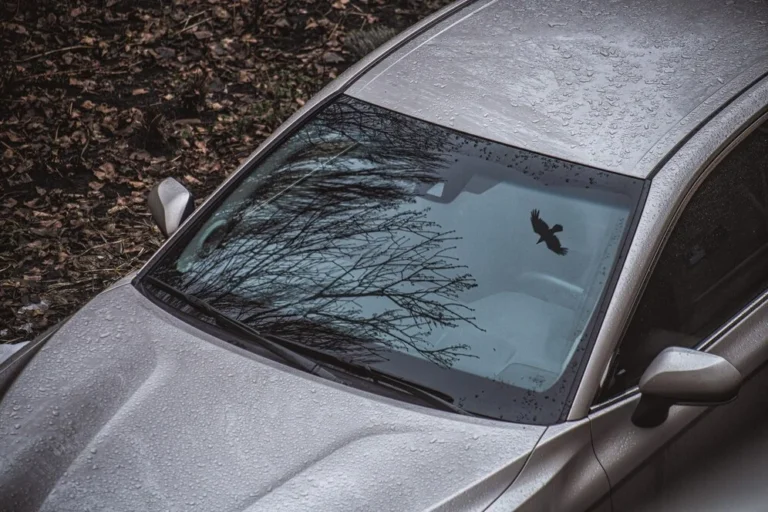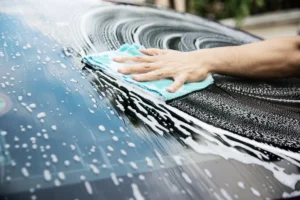When you think about threats to your car’s windshield, your mind probably jumps to flying debris on the highway, hailstorms, or even vandalism. But what most people don’t realize is that two of the biggest culprits are far more common—tree sap and bird droppings.
These may seem like harmless annoyances, but they actually pose a serious risk to your auto glass. While the immediate visual impact of sap and droppings might be minimal, the long-term consequences of neglecting them are far more substantial, and understanding these consequences is key to protecting your windshield. Ignore them long enough, and you could find yourself in need of help from auto glass experts. Here’s why.
The Sticky Problem with Tree Sap
If you’ve ever parked under a tree for some shade on a hot day, you may have returned to find your car covered in small, sticky spots. That’s tree sap, and while it may not seem like a big deal, it can cause serious damage if left untreated.
Tree sap is a natural resin that oozes from trees, and when it lands on your windshield, it hardens over time. As it solidifies, it creates a stubborn layer that clings aggressively to the glass surface. You may try scraping it off with your fingernail or windshield wipers, but that’s where the problem worsens. You may not see it, but the hardened sap can create microscopic scratches on the glass, weakening its integrity over time.
Worse yet, heat makes the issue more severe. If you leave sap sitting on your windshield for too long, the sun will essentially bake it onto the glass, making removal nearly impossible without using strong solvents. If you attempt to remove it improperly, you risk causing permanent damage. You might end up going on a trip for an auto glass repair in Ontario, CA or your local area because of a little sap.
The Hidden Dangers of Bird Droppings
Bird droppings are more than just unsightly—they’re acidic. A bird’s diet consists of seeds, berries, and insects, which makes their waste highly corrosive. When bird droppings sit on your windshield, they slowly eat away at the protective coatings on the glass. This weakens the windshield, making it more vulnerable to chips and cracks.
Think of it this way: if your windshield already has minor imperfections like tiny pits from road debris, bird droppings can exacerbate the problem. The acidity weakens the glass further, making it more susceptible to shattering when exposed to sudden pressure or temperature changes.
What Happens If You Ignore the Damage?
You might think, “It’s just a little sap” or “I’ll clean the bird droppings later.” But procrastination can lead to bigger problems. Once your windshield’s structural integrity is compromised, even a small pebble hitting your windshield at highway speeds can result in a full-blown crack. At that point, repairs may not be an option, and you’ll likely need a complete windshield replacement.
This is where Crack Windshield Repair & Window Tinting’s replacement service becomes essential. If your windshield shows signs of damage from prolonged exposure to tree sap or bird droppings, don’t wait for the problem to worsen. Address it before you’re forced to deal with a costly and inconvenient situation.
Protect Your Windshield
Now that you understand the risks, let’s talk about prevention. While you can’t control where birds decide to relieve themselves or stop trees from producing sap, you can take steps to minimize the damage.
First, be mindful of where you park. Avoid parking directly under trees, especially during warm months when sap flow is at its peak. The same goes for areas where birds tend to gather, like under power lines or in parking lots near food establishments. If you must park in these areas, consider using a windshield cover for added protection.
Next, clean your windshield regularly. If sap or bird droppings land on your windshield, remove them as soon as possible. A simple wipe with a damp cloth might work if the mess is fresh. But if the sap or droppings have dried, bring out a specialized cleaner.
For tree sap, rubbing alcohol or a small amount of acetone on a microfiber cloth can help dissolve the residue. Avoid using metal scrapers since they can scratch the glass further. Meanwhile, for bird droppings, a mixture of water and vinegar or a dedicated auto glass cleaner should do the trick. Let it soak for a few minutes before gently wiping it away.
Applying a rain-repellent treatment or glass sealant also creates a protective layer on your windshield, making it harder for sap and droppings to stick. Furthermore, it makes cleaning much easier, so you won’t have to struggle as much to remove stubborn spots.
Finally, invest in routine windshield inspections because even with the best preventive measures, damage can still occur. Regularly inspect your windshield for signs of scratches, pits, or weakening caused by exposure to sap and droppings. If you notice any issues, don’t hesitate to seek professional help.
Don’t Wait Until It’s Too Late
A strong, clear windshield isn’t just about visibility—it’s about protecting you and your passengers every time you hit the road. So, while tree sap and bird droppings may seem like minor nuisances, they can cause long-term damage to your auto glass if neglected.
Undeniably, the key to maintaining a clear and strong windshield is consistent care and timely intervention. By being proactive—parking wisely, cleaning contaminants quickly, and applying protective treatments—you can extend the life of your windshield and avoid costly repairs.
However, if damage has already set in, don’t risk your safety with a compromised windshield. Get in touch with the experts at Crack Windshield Repair & Window Tinting. Our technicians can assess the condition of your windshield and recommend whether repair or replacement is the best course of action.




